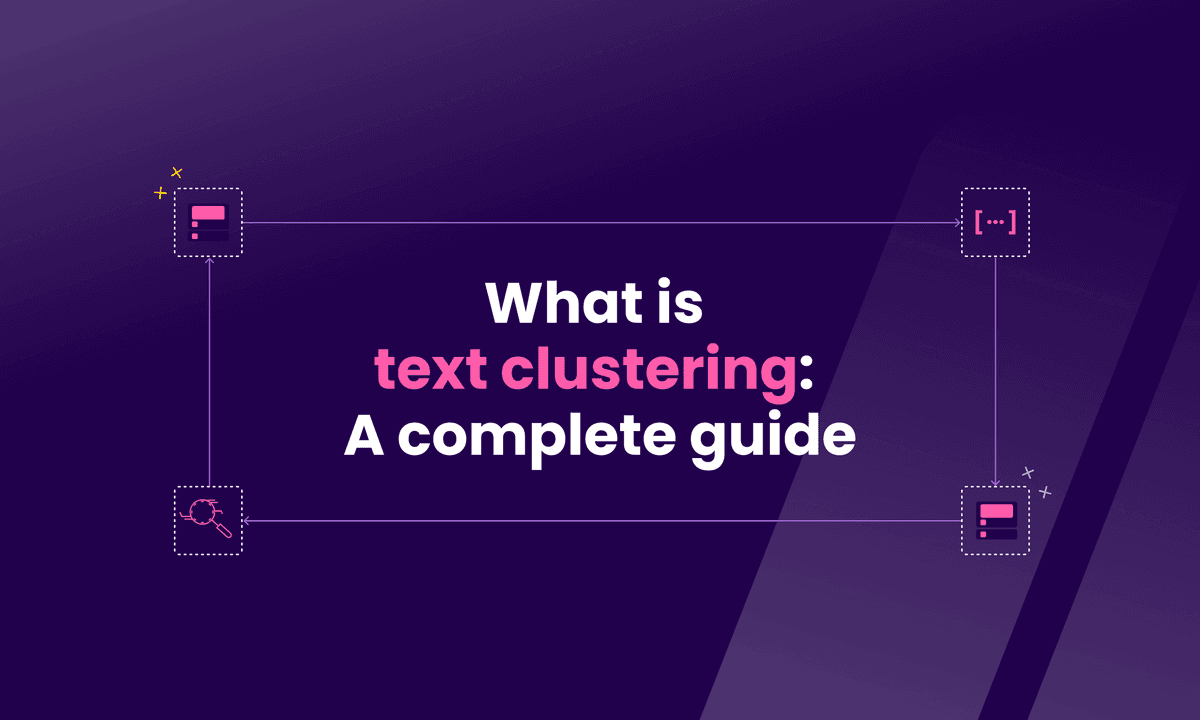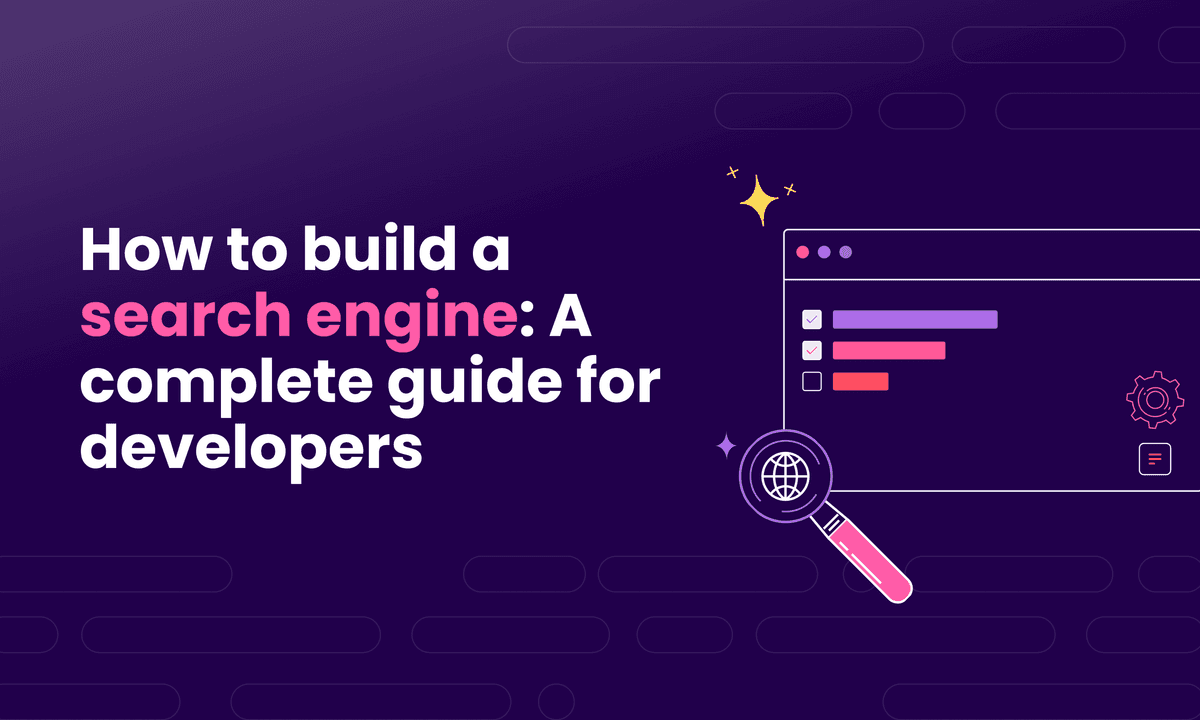Algolia vs Typesense vs Meilisearch: Which search engine powers better developer experiences in 2025?
Algolia vs Typesense comparison: Enterprise features vs simplicity. Plus discover Meilisearch - AI-powered search with developer-friendly setup.
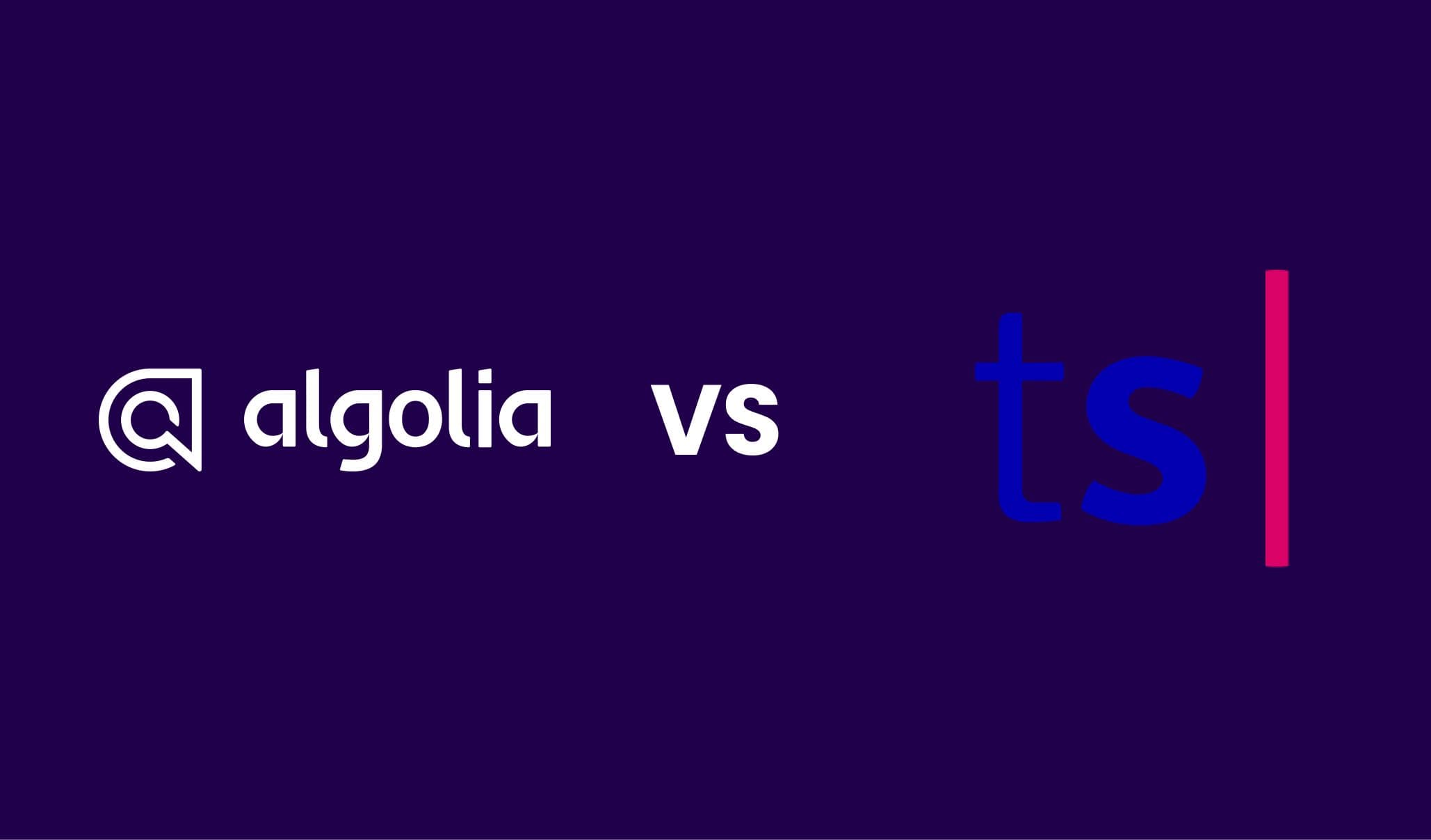
In this article
If you're comparing Algolia and Typesense for your search needs, you're likely wrestling with a fundamental trade-off: do you prioritize the comprehensive features and infrastructure of an established enterprise solution, or the simplicity and cost-effectiveness of a modern open-source alternative?
The comparison makes perfect sense. Both promise lightning-fast search experiences. Both offer typo tolerance and relevance tuning. Both claim to be developer-friendly. But their approaches to solving search challenges couldn't be more different.
Here's what most comparisons miss: the best search engine isn't necessarily the one with the most features or the lowest price. It's the one that matches your specific technical requirements, budget constraints, and growth trajectory.
In short, here's what we recommend:
👉 Algolia is the enterprise-grade search platform that powers over 17,000+ customers with its comprehensive AI-powered features and global infrastructure. With NeuralSearch for semantic understanding, dynamic re-ranking for relevance optimization, and personalization capabilities, it's built for companies that need every possible search feature at scale. However, this power comes with complexity and cost, with pay-as-you-go pricing that can quickly escalate based on usage.
👉 Typesense is the bootstrapped open-source alternative that prioritizes simplicity and performance over feature breadth. Written in C++ for maximum efficiency, it delivers search results in under 50 milliseconds with minimal configuration required. While it excels at providing fast, typo-tolerant search with a gentle learning curve, it now includes vector search and semantic capabilities, making it more competitive than ever for teams that value simplicity.
Both platforms have transformed how developers implement search. But there's a third option that might better balance the enterprise features of Algolia with the simplicity and open-source ethos of Typesense.
👉 Meilisearch combines the best of both worlds: the ease of use and cost-effectiveness of open-source with enterprise-ready AI features like hybrid search. Built in Rust for performance and designed for developer happiness, it offers lightning-fast search (under 50 milliseconds) with minimal configuration. Unlike Typesense's GPL license or Algolia's proprietary model, Meilisearch's MIT license provides maximum flexibility while maintaining the simplicity developers love.
If you want enterprise-grade search features without enterprise-grade complexity or costs, see how Meilisearch can transform your search experience with a 14-day free trial.
Algolia vs Typesense vs Meilisearch at a glance
Here's how these three search engines fundamentally differ in their approach to solving search challenges:
| Algolia | Typesense | Meilisearch | |
|---|---|---|---|
| Core Philosophy | ⭐⭐⭐⭐ Comprehensive cloud platform | ⭐⭐⭐⭐ Simple, lightweight alternative | ⭐⭐⭐⭐⭐ Developer-friendly with AI power |
| Founded | 2012 | 2016 | 2018 |
| Funding | $315M (valued at $2.25B) | Bootstrapped | $22M |
| Open Source | ❌ Proprietary | ✅ GPL-3.0 | ✅ MIT License |
| Speed | ⭐⭐⭐⭐ Under 100ms | ⭐⭐⭐⭐⭐ Under 50ms | ⭐⭐⭐⭐⭐ Under 50ms |
| Starting Price | Free tier, then pay-as-you-go | Resource-based (hourly) | $30/month or resource-based pricing |
| AI Features | ⭐⭐⭐⭐⭐ NeuralSearch, personalization | ⭐⭐⭐⭐ Vector search, semantic, NLP | ⭐⭐⭐⭐ Hybrid search, automated embeddings |
| Ease of Setup | ⭐⭐⭐ Moderate complexity | ⭐⭐⭐⭐⭐ Very simple | ⭐⭐⭐⭐⭐ Plug-and-play |
| Scalability | ⭐⭐⭐⭐⭐ Global infrastructure | ⭐⭐⭐⭐ Multi-node clustering | ⭐⭐⭐⭐ Vertical scaling, Enterprise sharding |
| Best For | Large enterprises | Cost-conscious developers | Growing companies |
The fundamental architecture differences shape everything
Understanding how each platform is built reveals why they excel in different scenarios.
Algolia operates as a fully managed cloud service built on a globally distributed infrastructure. With data centers across multiple regions and a Distributed Search Network (DSN), it processes over 1.75 trillion searches annually. This architecture ensures 99.999% uptime for enterprise customers and handles massive scale effortlessly. The platform isolates indexing operations from search performance, ensuring consistent response times.
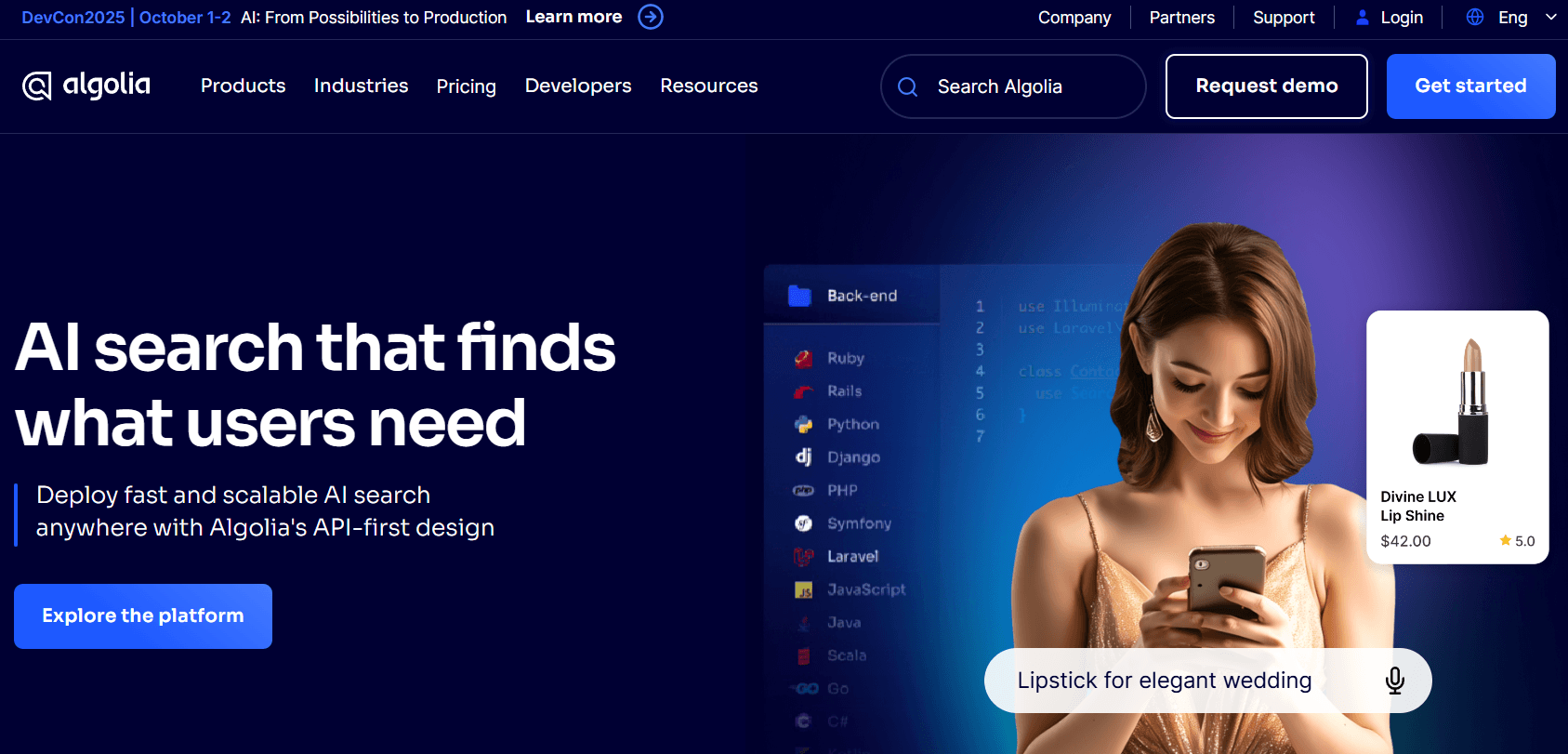
Typesense takes a radically different approach with its single binary, written in C++ for maximum performance. The entire index lives in RAM, which explains its blazing-fast sub-50ms response times. This simplicity is by design: you can get Typesense running with a single Docker command. While primarily designed for single-node deployment, Typesense supports multi-node clustering via Raft consensus for high availability.
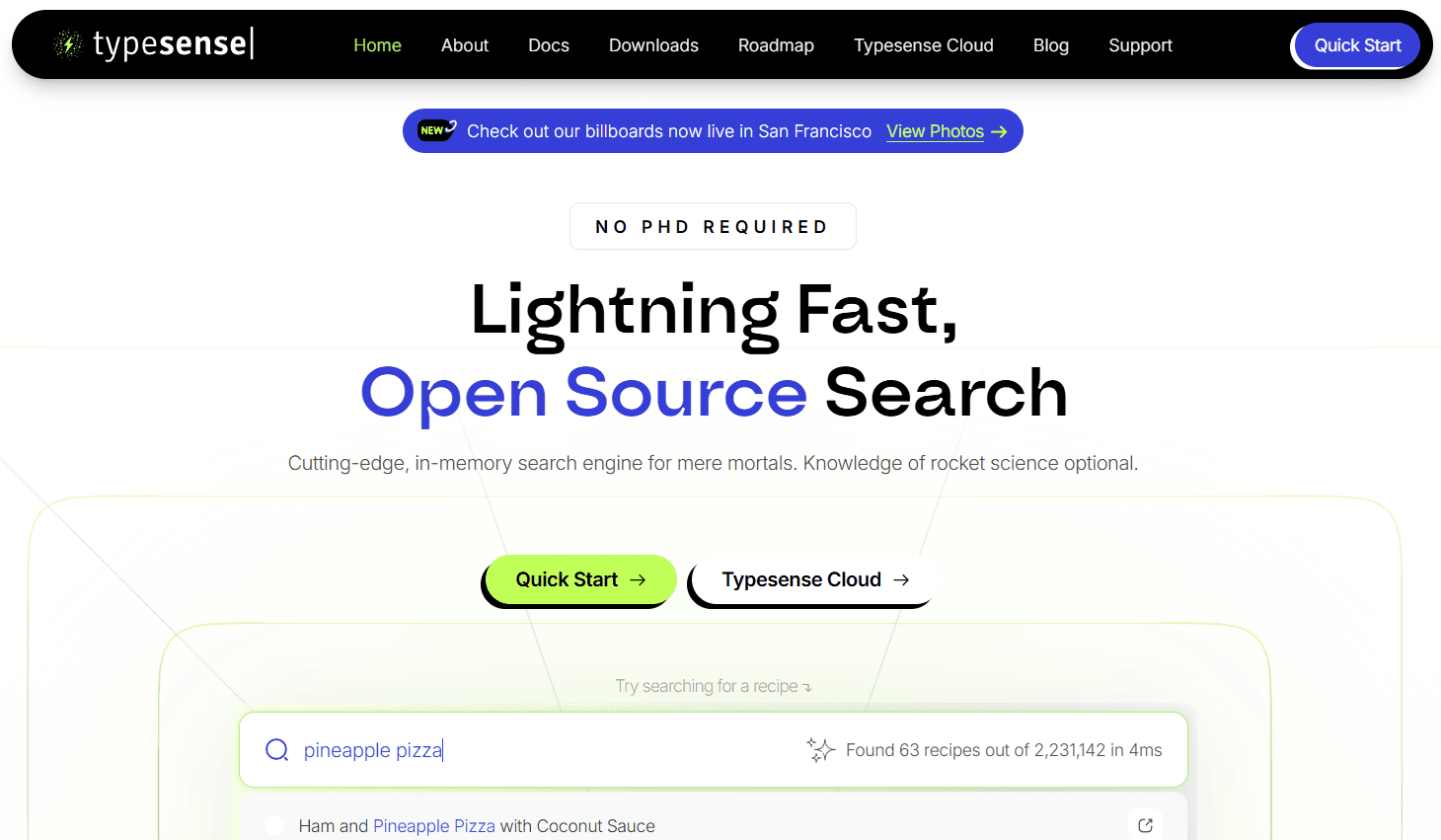
Meilisearch, built in Rust, strikes a middle ground. It uses Lightning Memory-Mapped Database (LMDB) for storage, combining the performance benefits of in-memory operations with the reliability of disk persistence. Like Typesense, it's designed primarily for single-node deployment, but its architecture is optimized for both speed and ease of use. The system creates approximately 20 different inverted indexes for each document index to optimize various search features. The Enterprise Edition now offers experimental sharding for horizontal scaling.
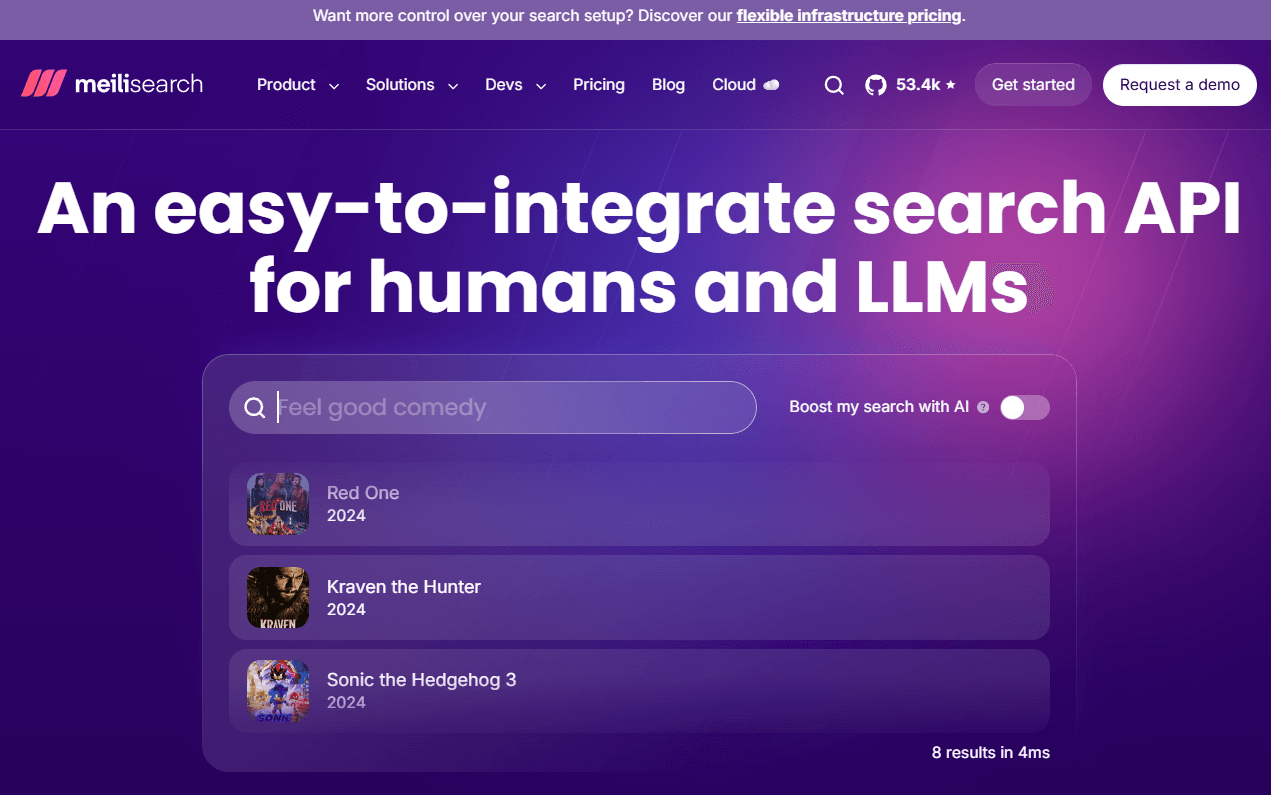
These architectural decisions cascade into everything else: pricing, features, scalability, and operational complexity.
Algolia dominates features but at what cost?
Algolia's feature set reads like a wishlist for search engineers. NeuralSearch combines keyword and vector search through proprietary Neural Hashing technology, delivering semantic understanding at scale. The platform can automatically generate synonyms using AI, dynamically re-rank results based on user behavior, and personalize search experiences for individual users.

The depth is impressive. Dynamic Re-Ranking analyzes 30 days of user interaction data to automatically boost trending items. Personalization builds affinity profiles for each user based on their behavior over 90 days. The platform includes numerous integrations, supports 70+ languages, and offers specialized features for e-commerce like visual merchandising and collections management.
But this comprehensiveness comes with complexity. Users report a steep learning curve for advanced features. The dashboard can feel overwhelming with its multitude of options. And while basic setup might be straightforward, fully leveraging Algolia's capabilities often requires significant technical expertise and time investment.
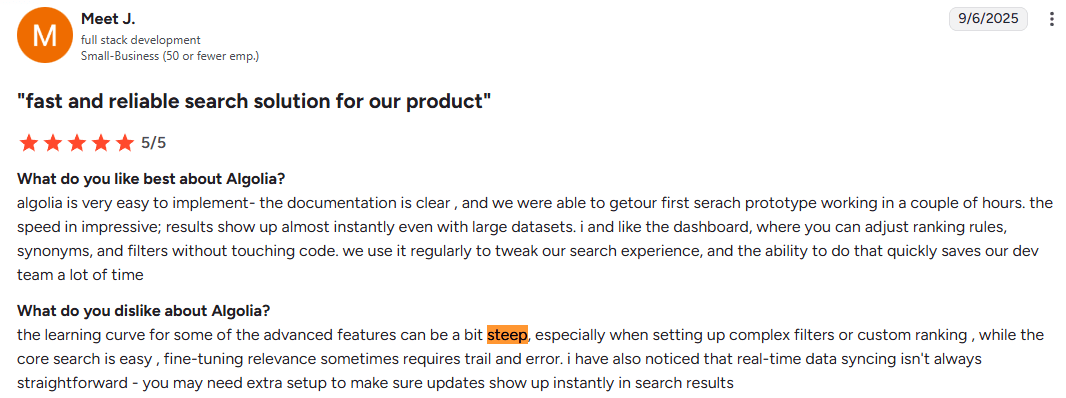
The cost is another consideration. Algolia now offers a free Build tier with generous limits, followed by pay-as-you-go Grow pricing. While this eliminates the barrier to entry, usage-based pricing for records and searches means costs can become unpredictable as you scale, particularly for high-volume applications.
Typesense wins on simplicity with growing capabilities
Typesense's philosophy is refreshingly straightforward: provide fast, typo-tolerant search that just works. Setup involves creating a collection with a schema, indexing documents, and performing searches. The entire process can be completed in minutes, not hours.
The built-in typo tolerance is exceptional, handling misspellings automatically without configuration. Dynamic sorting allows you to reorder results at query time without creating separate indices (unlike Algolia). The synonyms feature supports both one-way and multi-way relationships. Natural Language Search, powered by LLMs, lets users search conversationally.
Recent updates have significantly expanded Typesense's capabilities. Vector search support enables semantic search use cases. Automatic embedding generation removes the complexity of working with vectors. The platform now supports hybrid search combining keyword and semantic approaches. Multi-node clustering via Raft provides high availability for production deployments.
For developers frustrated with Elasticsearch's complexity or Algolia's cost, Typesense feels like a breath of fresh air. The API is intuitive, the documentation is clear, and the learning curve is gentle. You can have a production-ready search implementation running quickly.
However, Typesense's focus on simplicity means some trade-offs. There's no built-in personalization engine comparable to Algolia's. Analytics capabilities remain basic. E-commerce features like advanced merchandising and promotions are limited compared to enterprise platforms.
Meilisearch bridges the gap with AI-powered simplicity
Meilisearch enters the conversation with a compelling proposition: what if you could have Algolia's advanced features with Typesense's simplicity?
The platform delivers on this promise through thoughtful design choices. Typo tolerance works out-of-the-box without configuration. The ranking rules are pre-configured for relevance but fully customizable. Setting up search takes minutes, but you're not limited to basic functionality.
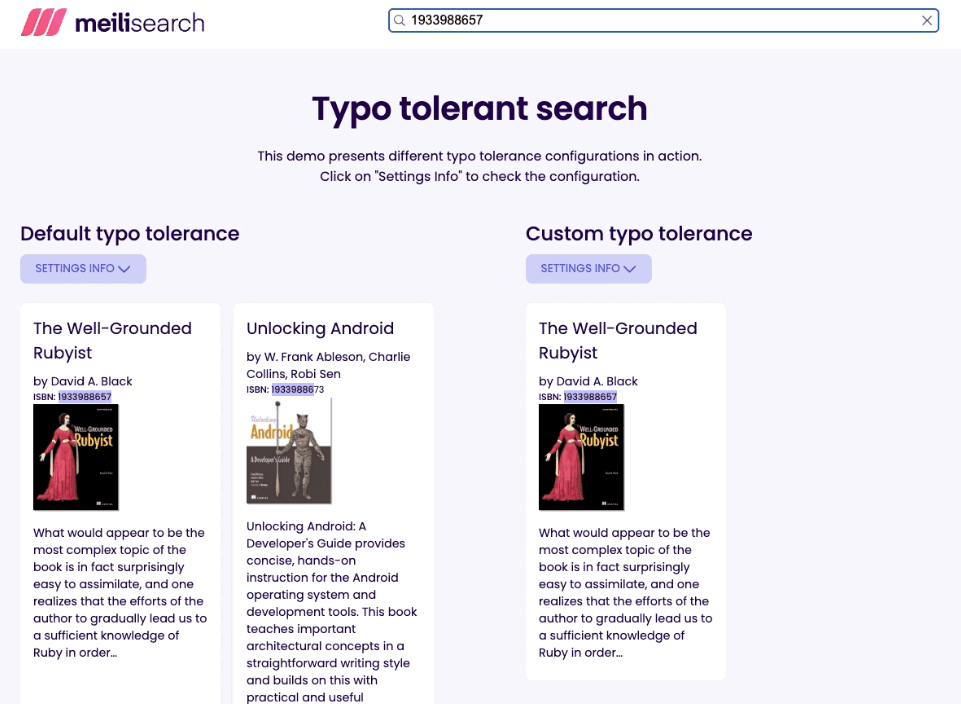
Where Meilisearch truly shines is its AI capabilities. The hybrid search feature seamlessly combines traditional keyword search with semantic vector search, delivering contextually relevant results without complex setup. Automated embedding generation handles the heavy lifting of creating vector representations, supporting providers like OpenAI and Hugging Face. Document templates let you optimize embedding quality without manual intervention.
The platform recently added features that compete directly with Algolia's enterprise offerings. Multi-tenancy through tenant tokens enables secure, isolated search for SaaS applications. Geosearch supports location-based queries. Faceted search with distribution counts enables sophisticated filtering interfaces.
Yet Meilisearch maintains the developer-friendly approach that made it popular. The RESTful API is intuitive. SDKs exist for major programming languages. The documentation is comprehensive and clear. Users consistently praise how quickly they can go from zero to a working search implementation.
Developer experience varies dramatically between platforms
The developer experience fundamentally differs across these platforms, affecting both initial implementation and ongoing maintenance.
Algolia provides comprehensive resources with extensive documentation covering every feature in detail. The dashboard offers powerful capabilities for managing search experiences. Setting up basic search might be straightforward, but implementing advanced features like personalization or NeuralSearch requires investment in understanding the platform's nuances.
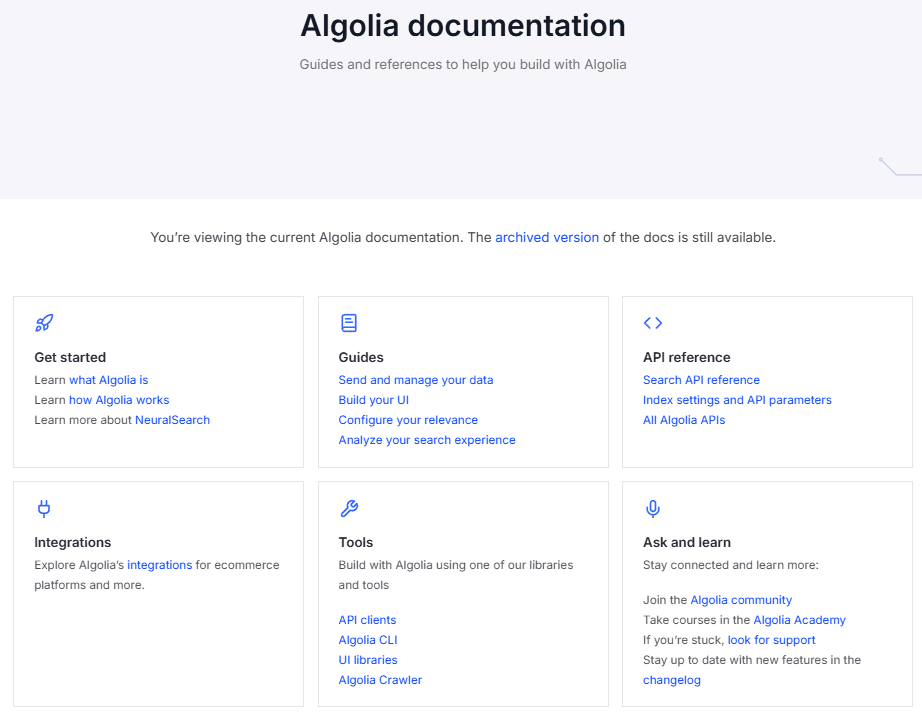
Typesense embraces radical simplicity. The documentation is thorough yet approachable, covering essential concepts without overwhelming detail. The API follows RESTful conventions religiously. Most features work with sensible defaults, requiring configuration only when you need something specific. Developers consistently report being productive within hours of starting.
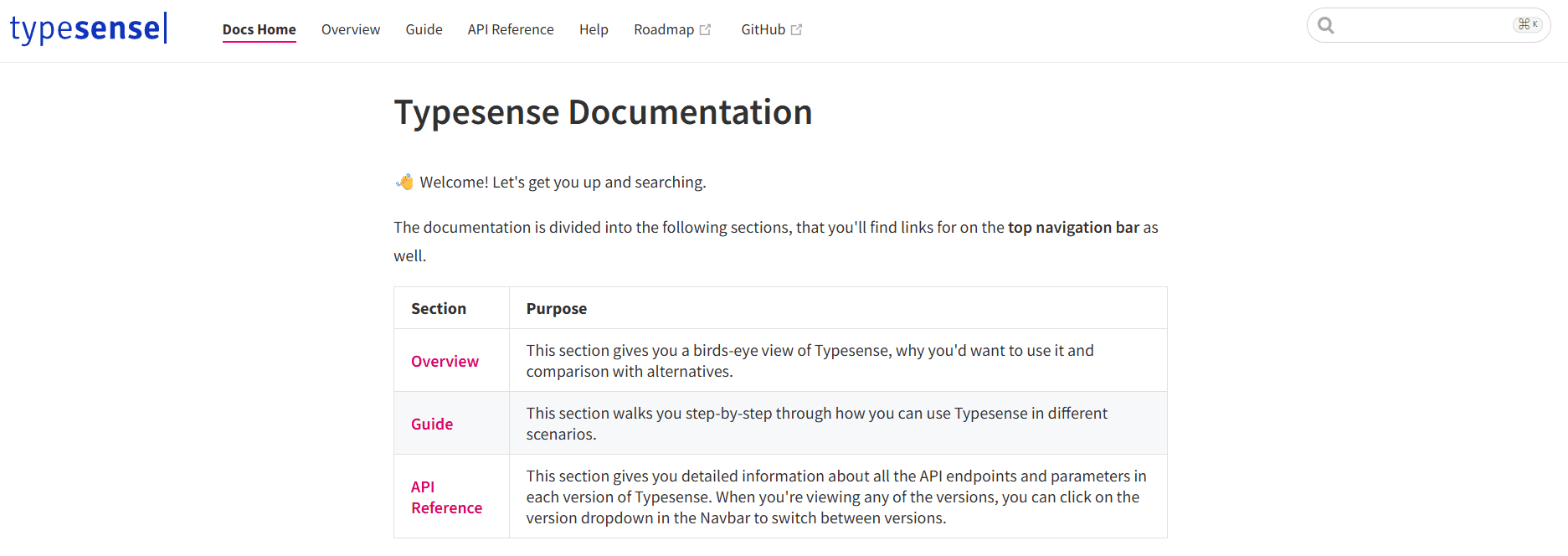
Meilisearch hits a sweet spot for developer experience. The documentation is comprehensive yet approachable, with clear examples and step-by-step guides. The web interface provides a modern, intuitive dashboard for testing queries and managing indices. The API is well-designed with helpful error messages. Features work well out-of-the-box but remain highly customizable.
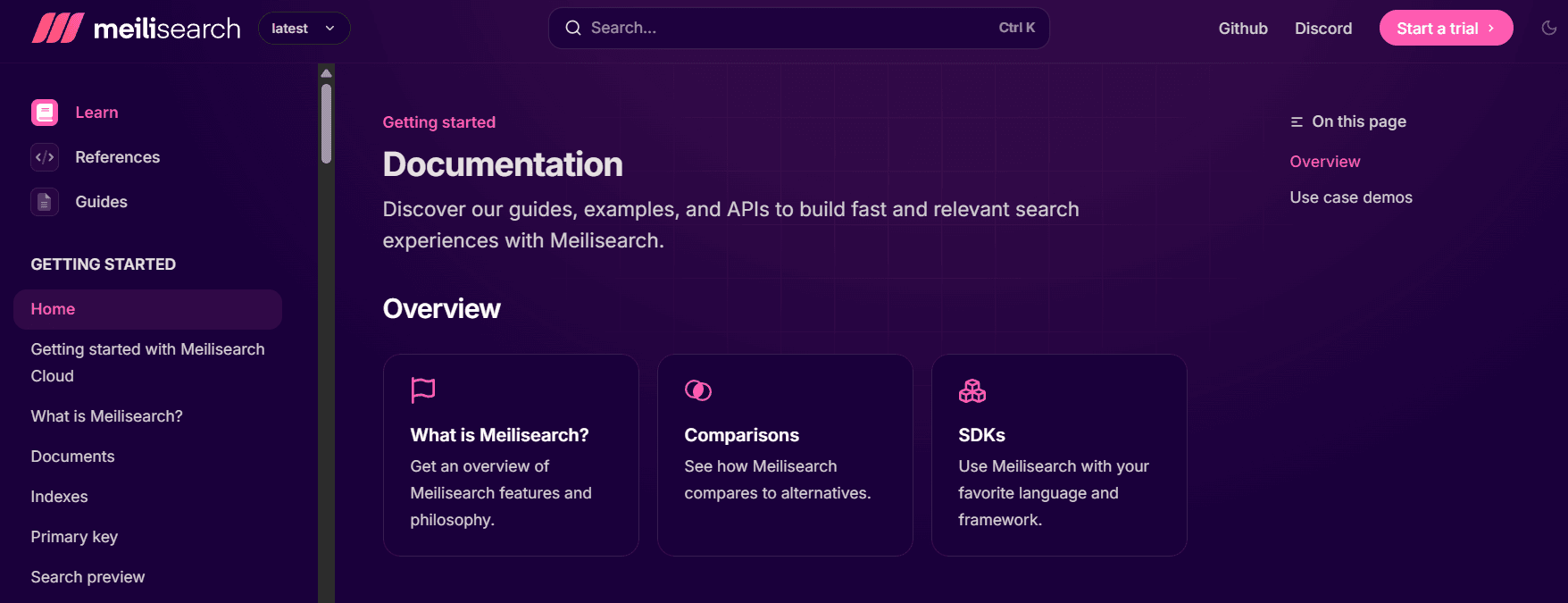
The learning curves reflect these differences: Typesense offers the gentlest introduction, Meilisearch provides an excellent balance of power and simplicity, while Algolia requires more time to master its extensive capabilities.
Pricing models reflect different philosophies
The pricing structures reveal each platform's target market and business model.
Algolia's pricing is usage-based with a generous free tier. The Build plan offers 10,000 records and 10,000 searches monthly at no cost. Beyond that, the Grow plan charges per search request and per record stored, with additional features available as add-ons. While this model eliminates upfront costs, usage-based pricing can create budget uncertainty as applications scale.
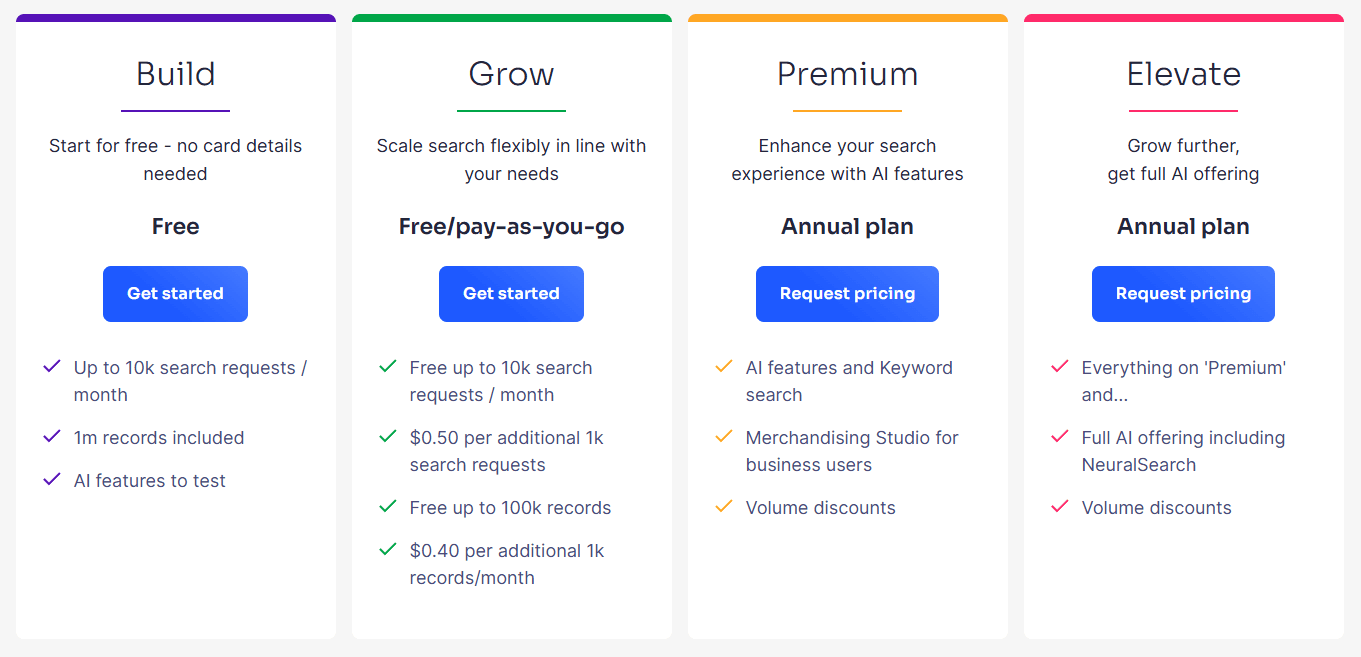
Typesense Cloud takes a resource-based approach. You pay hourly for the cluster resources (RAM and vCPUs) you provision, plus bandwidth. There are no limits on records or searches, just the performance constraints of your allocated resources. This model is more predictable and often more cost-effective, especially for applications with many small records. The self-hosted option is completely free under GPL-3.0.
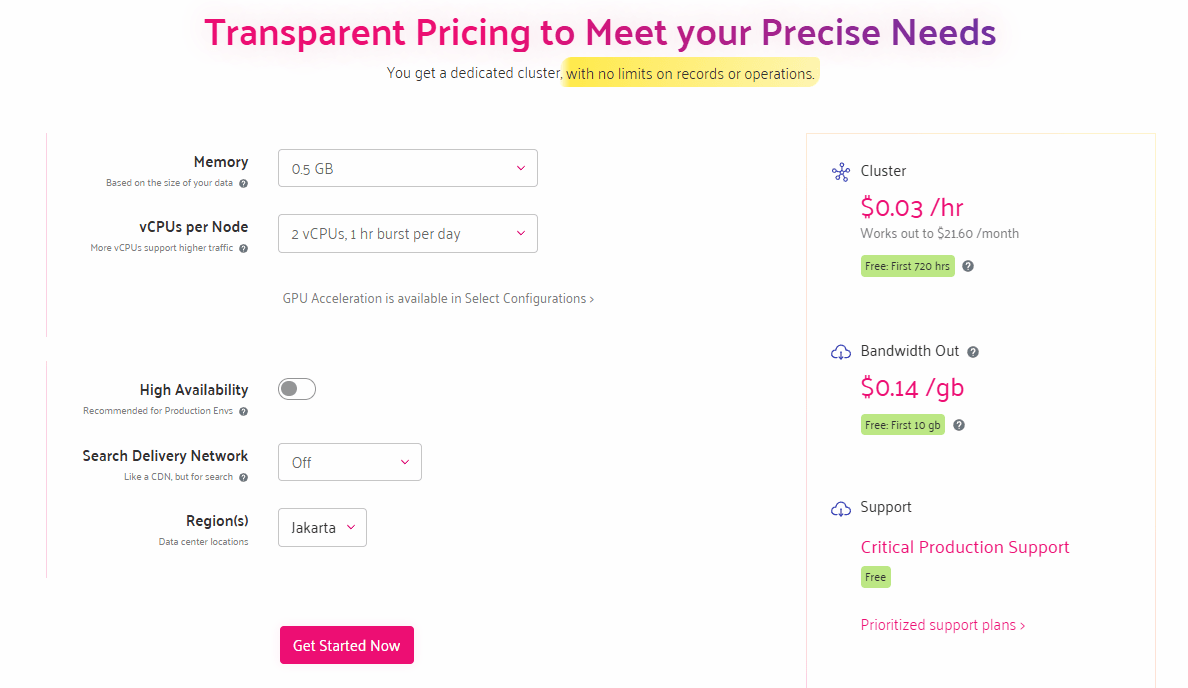
Meilisearch offers the most flexibility with a unique dual pricing approach. Unlike competitors who lock you into a single model, Meilisearch provides both subscription-based and resource-based pricing options.
The subscription model starts at $30/month for the Build plan (50,000 searches, 100,000 documents) with transparent overage pricing, while the Pro plan at $300/month includes 250,000 searches and 1 million documents.
For customers who need more control and predictability at scale, the resource-based pricing lets you pay only for the resources you use, eliminating surprise overages. This dual approach means you can choose the model that fits your specific needs and growth stage. The open-source version remains free under MIT license (more permissive than Typesense's GPL), and all Cloud users get a 14-day free trial to test the platform.
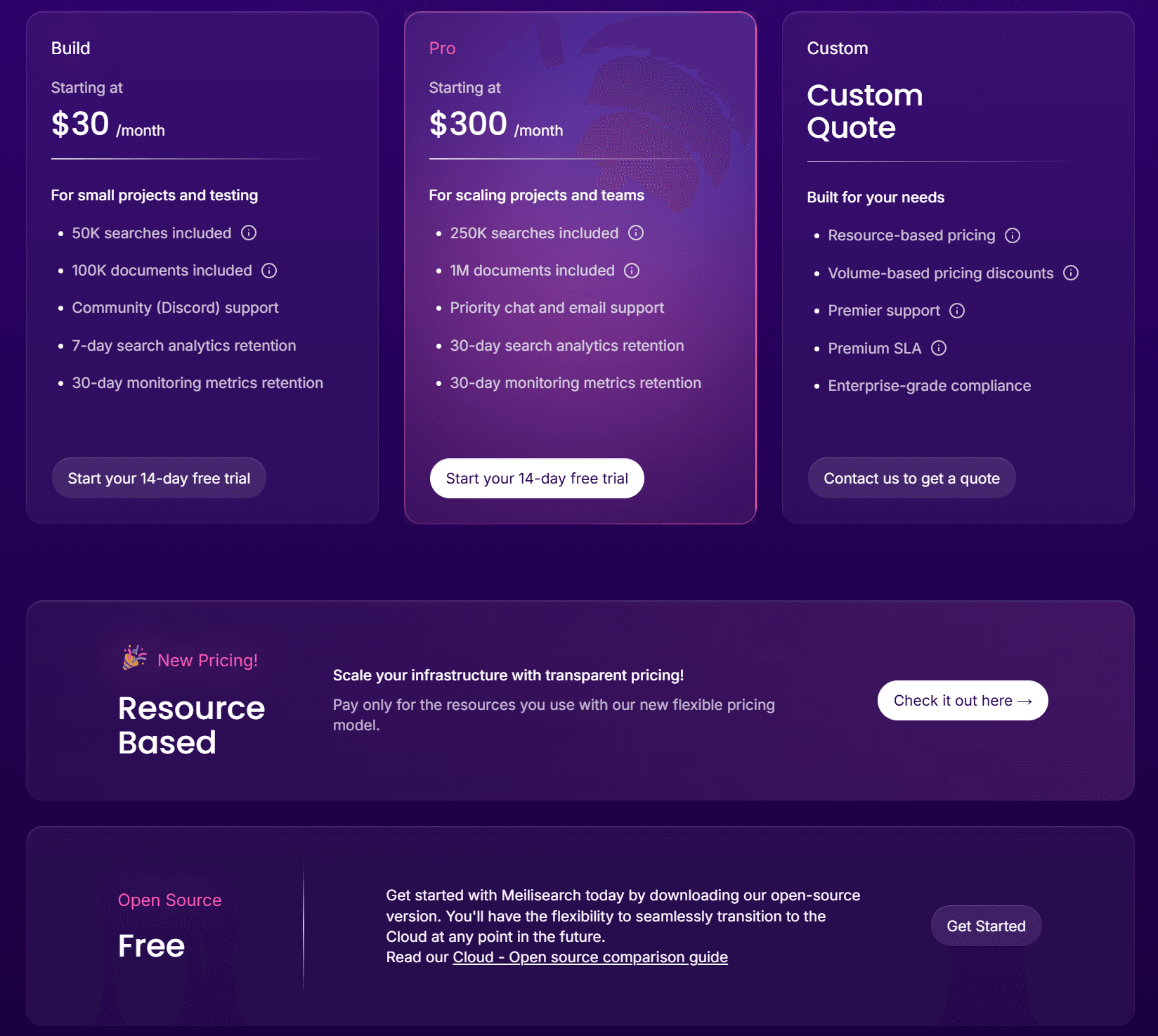
Deployment and scaling considerations matter
How these platforms deploy and scale significantly impacts their suitability for different use cases.
Algolia is purely cloud-based with no self-hosting option. This simplifies operations but means vendor lock-in and potential compliance issues for sensitive data. The global infrastructure handles scaling automatically, supporting everything from startups to enterprises processing billions of searches. You never worry about infrastructure, but you also have no control over it.
Typesense offers maximum deployment flexibility. Self-host with Docker, deploy on any cloud provider, or use Typesense Cloud. The architecture supports both single-node deployments for simplicity and multi-node clusters for high availability. Vertical scaling (adding more RAM/CPU) handles most growth scenarios, while clustering provides redundancy and load distribution. For datasets that fit in RAM, Typesense performs exceptionally.
Meilisearch provides similar deployment options to Typesense: self-host anywhere or use Meilisearch Cloud. The architecture handles larger datasets better than Typesense due to its memory-mapped storage approach. The documented maximum index size is 80TiB on Linux, though performance is best under 2TiB.
The Enterprise Edition now offers experimental sharding for horizontal scaling, expanding possibilities for large-scale deployments. This deployment flexibility pairs perfectly with the dual pricing model, allowing you to optimize both infrastructure and costs based on your specific requirements.
Algolia vs Typesense vs Meilisearch: Which should you choose?
The choice depends on your specific requirements, technical capabilities, and growth trajectory.
Choose Algolia if:
- You need comprehensive AI-powered search features
- Global scale and 99.999% uptime are requirements
- You have the budget for usage-based pricing
- You want extensive integrations and enterprise support
- You prefer fully managed infrastructure
Get started with Algolia's free Build tier
Choose Typesense if:
- Simplicity and ease of use are paramount
- You need extremely fast search performance
- Your dataset fits comfortably in RAM
- Cost predictability is important
- You prefer open-source solutions with clustering options
Deploy Typesense with Docker in minutes
Choose Meilisearch if:
- You want advanced AI features without complexity
- Developer experience is a priority
- You need a balance of features and simplicity
- You want the unique flexibility of choosing between subscription-based and resource-based pricing models
- You want flexible deployment options with permissive licensing
- You're building a SaaS application with multi-tenancy needs
Start your free 14-day trial of Meilisearch Cloud
The search engine landscape in 2025 offers more choices than ever. Algolia remains the premium option for enterprises needing every possible feature. Typesense provides a powerful yet simple alternative for developers who want fast, reliable search. But Meilisearch increasingly looks like the optimal choice for the vast middle ground: teams that need more than basic search but don't want Algolia's complexity or cost.
The best search engine isn't the one with the most features or the lowest price. It's the one that helps you deliver a great search experience to your users without overwhelming your team or budget. For most growing companies, that sweet spot is exactly where Meilisearch lives.
Experience the balance of power and simplicity with Meilisearch
Why choose between enterprise features and developer-friendly simplicity when you can have both? Meilisearch delivers AI-powered hybrid search, sub-50ms performance, and flexible deployment options—all with the intuitive API and transparent pricing that developers love. Perfect for growing companies that need more than basic search without the complexity of Algolia.
